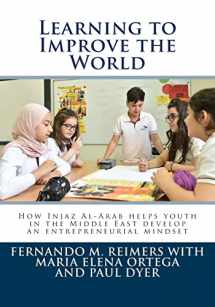
Learning to Improve the World: How Injaz Al-Arab helps youth in the Middle East develop an entrepreneurial mindset
Book details
Summary
Description
The world is changing rapidly. Globalization and technological innovation have created new opportunities and challenges for individuals, communities and nations. With these changes it has become necessary to revisit to what extent children and youth are being prepared to be effective and productive citizens and workers, and to what extent they are equipped not just to understand the future, but to invent it. In the 21st century the skills and dispositions necessary to live meaningful lives, to participate socially, civically and economically, have expanded from those which were sufficient in the past. Over the last decades, an emerging consensus has formed around the idea that knowledge of facts alone is insufficient to prepare youth for a future that is increasingly volatile and uncertain. Students must be educated not just to understand the world, but to improve it, they need to be equipped to become creators and makers, and not just spectators of the world in which they live. Entrepreneurship education, a specific set of educational programs aimed at teaching students and adults the skills to initiate and sustain a business, is an avenue to develop some of these skills and attitudes. This book presents the study of a program designed to cultivate an entrepreneurial mindset among high school students in the Middle East. The results of this study advance knowledge about how entrepreneurship education helps youth develop some of these competencies, preparing them to ‘Improve the world’. The study focuses on the impact of an entrepreneurship education program administered to high school students in six countries in the Middle East, a region with relatively high levels of youth unemployment. The program is relatively simple, and therefore scalable, it involves bringing to schools a person with business experience, who works with youth teaching them how to create a company. The results of this study will be of interest not only to those who care about the opportunities available to youth in the Middle East. The search for effective avenues to help students develop an expanded set of skills extends beyond the Middle East to the entire global education ecosystem. While the levels of youth unemployment are higher today in the Middle East than in other regions of the world, many predict that the fourth industrial revolution, resulting from increased and ubiqitous automation and the development of artificial intelligence, will eliminate many of the jobs currently available. Together with neurotechnological and genetic developments these changes will create new opportunities as well as serious challenges, which require a heightened commitment to putting humans at the center, and empowerment as a goal (Schwab 2017). These developments create a new urgency to advance knowledge about how to empower youth to invent the future, in the Middle East and beyond.


We would LOVE it if you could help us and other readers by reviewing the book
Book review



